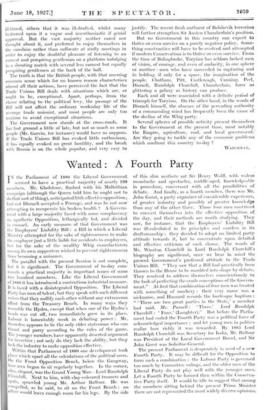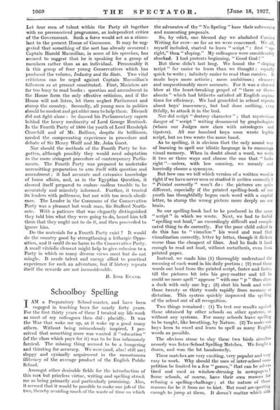Wanted : A Fourth Party
X the Parliament of 1880 the Liberal Government I seemed to have a practical majority of nearly 130 members. Mr. Gladstone, flushed with his Midlothian campaign (although the Queen told him he ought not to do that sort of thing), anticipated little effective opposition had not Disraeli accepted a Peerage, and was he not now attempting to recuperate his.broken health ? A GoVern- ment with a large majorityfaced with some complacency. an apathetic Opposition, lethargically led, and divided in counsel. An early measure of that Government was the Employers' Liability Bill a Bill in which a Liberal Ministry attempted for the sake of righteousness to make the employer just a little liable for accidents to employees, but for the sake of the wealthy Whig manufacturers among its own supporters wished to prevent righteousness from becoming a nuisance.
The parallel with the present Session is not complete, but it is significant. The Government of to-day com- mands a practical majority in important issues of some two hundred members. Like the Liberal Government of 1880 it has introduced a contentious industrial measure. It is faced with a disintegrated Opposition. The Liberal Party has men of talent, but they speak with such different voices that they nullify each other without any extraneous effort from the TreasUry Bench. In many ways they resemble the Hydra, except that when one of the Hydra's heads was cut off, two immediately grew in its place. Labour is lamentably weak in debating power : Mr. Snowden appears to be the only elder statesman who can thrust and parry according to the rifles of the game. The younger members have apparently deserted argument for invective ; not only do they lack the ability, but they lack the industry to make opposition effective. Within that Parliament of 1880 one development took place which upset-all the calculations of the political seers. On the Front Opposition Bench, below the Gangway, four men began to sit regularly together. In the corner, slim, elegant, was the Grand Young Man—Lord Randolph Churchill. Next to him, with clay-coloured trousers and spats, spraWled • young Mr. Arthur Balfour. He was compelled, as he said to sit on the Front Bench : no other would leave enough room for his legs. By the side of this slim aesthete sat Sir Henry Wolff, with walrus moustache and spectacles, middle-aged, knowledgeable in procedure, conversant with all the possibilities of debate. And finally, as a fourth member, there was Mr. John Gorst, a party organizer of considerable experience,. of greater industry and possibly of greater knowledge than any of the other three. Those four men contrived to convert themselves into the effective opposition. of the day, and their methods arc worth studying. They saw, for instance, that the Employers' Liability Bill was ill-calculated in its principles and . careless in its draftsmanship :, they decided to adopt no limited party. attitude towards it, but to concentrate upon detailed and effective criticism of each clause. The words of Mr. Winston Churchill in Lord Randolph Churchill's biography arc significant, once we bear in mind the present Government's professed attitude to the Trade Unions Bill. " They saw that a Bill had practically been thrown to the House to be moulded into shape by debate. They resolved to address themselves conscientiously to the task of perfecting the crude conceptions of the Govern- ment." At first that combination of four men was treated with something of mockery : their very name was a nickname, and Hansard records the burlesque baptism : " There arc two great parties in the State,' a member had said. Mr. Parnell : Three.' Lord Randolph Churchill : Four.' (Laughter)." But before the Parlia- ment had ended the Fourth Party was a political force of acknowledged importance ; and let young men in polities realize how richly it was rewarded. By 1885 Lord Randolph Churchill was Secretary for India, Mr. Balfour was President of the Local Government Board, and Sir John Gorst was Solicitor-General.
The present Parliament is desperately in need of a new Fourth Party. It may be difficult for the Opposition to form such a combination : the Labour Party is governed too much by Committee rulings, and .the older men of the Liberal Party do not play well with the younger ones. Let a Fourth Party be formed then within the Conserva- tive Party itself. It would be idle to suggest that among the members sitting behind the present Prime Minister there are not represented the most widely diverse opinions. Let four men of talent within the Party sit together with no preconceived programme, as independent critics of the Government. Such a force would act as a stimu- lant to the present House of Commons. It may be sug- gested that something of the sort has already occurred : Captain Harold Macmillan, in some of his speeches, has seemed to suggest that he is speaking for a group of members rather than as an individual. Presumably it is this group of four young Conservatives which has produced the volume, Industry and the State. Two vital criticisms can be urged against Captain Macmillan's followers as at present constituted. First, Ministers are far too busy to read books : question and amendment in the House form the only effective criticism, and if the House will not listen, let them neglect Parliament and stump the country. Secondly, all young men in politics should be modest and get older men to help them. Disraeli did not fight alone : he danced his Parliamentary capers behind the heavy mediocrity of Lord George Bentinck. In the Fourth Party of 1880 the youth of Lord Randolph Churchill and of Mr. Balfour, despite its brilliance, needed the compensating experience in procedure and debate of Sir Henry Wolff and Mr. John Gorst. Nor should. the methods of the Fourth Party be for- gotten, although possibly they would need adaptation to the more stringent procedure of contemporary Parlia- ments. The Fourth Party was prepared to undertake unremitting preparation to arm itself with question and amendment ; it had accurate and extensive knowledge of home affairs, and, as in the Egyptian Question, it showed itself prepared to endure endless trouble to be accurately and minutely informed. Further, it treated its leaders with politeness, but not with too much obedi- ence. The Leader in the Commons of the Conservative Party was a pleasant but weak man, Sir Stafford North- cote. With a patience that was elegantly distinguished they told him what they were going to do, heard him tell them that they ought not to do it, and then proceeded to ignore him.
Do the materials for a Fourth Party exist ? It would do the country good by strengthening a lethargic Oppo- sition, and it could do no harm to the Conservative Party. A small vitriolic element might help to give cohesion to a Party in which so many diverse views meet but do not mingle. It needs talent and energy allied to practical experience for such an adventure, but if history repeats itself the rewards are not inconsiderable.
B. It-on. EVANS.



























































 Previous page
Previous page